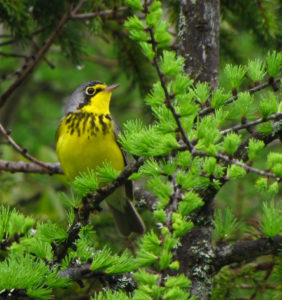Summary of threats to the populations of Canada Warbler (Cardellina canadensis)
- Breeding Habitat Loss and Degradation:
- Drainage and conversion of wet forests for development (eastern part of the range).
- Deforestation for agriculture and by the oil and gas industry (western part of range).
- Deer browsing limits the understory canopy and renders habitat unsuitable.
- Road development – Proximity to roads and length of roads has a negative impact on breeding success and occurrence of Canada warblers.
- Decline in insect abundance and outbreaks – Population densities of Canada warblers are correlated with spruce budworm outbreaks, so population declines may be due in part to a reduction in insect outbreaks and declines of insect abundance.
Winter Habitat Loss and Degradation:
- Wide-spread deforestation has historically altered much of the wintering habitat in northern South America, and this deforestation continues to occur. Specifically, the Andean sub-tropical forest is one of the most threatened forests in the world.
Source: COSEWIC. (2008). COSEWIC Assessment and Status Report on the Canada Warbler Wilsonia canadensis. Committee on the Status of Endangered Wildlife in Canada. Ottawa: vi+35.

